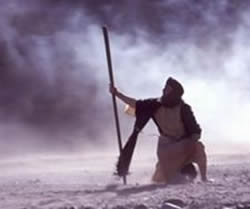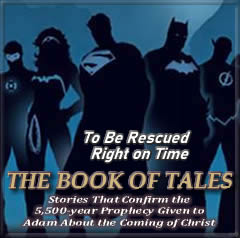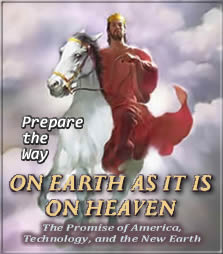Misconception #44
Moses Spent Forty Years as a Lonely Shepherd Before He Led Israel in the Exodus
Living in our modern age of mass communication, there are times when even the King James Version of The Bible can’t be blamed for a great misconception. Sometimes the culprit lies with the mass media itself. More specifically, what I’m talking about is our motion picture tradition. Just as we saw how the movie The Ten Commandments solidified the erroneous idea that the Israelites were always slaves in Egypt until the Exodus, we’re now faced with another bit of skewed history this film presents as historical fact.
Once more, Cecil B. DeMille is calling the shots instead of the Lord of Hosts.
According to Mr. DeMille, Moses was very happy growing up in the royal splendor of Pharaoh’s court, until the day he discovered that he’d actually been born the son of Hebrew slaves. Suddenly finding himself torn between two ways of life, Moses chose to side with his beleaguered people, whom he saw ceaselessly toiling under the crack of Egyptian whips.
Then, upon seeing an Egyptian overlord whipping one of his Hebrew brethren, Moses boldly stepped forward and strangled the Egyptian with his own whip. For the crime of murdering an overlord of Egypt, Moses—who could’ve one day been Pharaoh himself—was sent to die in the Wilderness.
Weary and dismayed, Moses wandered for days through the blistering heat of the desert. Then, at the brink of death, he stumbled upon a well and was refreshed by its waters; there he met the seven daughters of Jethro, who happily provided him safe haven.
Story Continues Below
Says Richard Price—the founder and CEO of Academia.edu—on his podcast In Depth With Academia:
Fish Tales (From the Belly of the Whale): Fifty of the Greatest Misconceptions Ever Blamed on The Bible is:
To hear Price’s book review of Fish Tales (From the Belly of the Whale), CLICK HERE.
To hear Kent and Zen Garcia talk about correcting biblical misconceptions, from September 9th, 2021, CLICK BELOW.
Story Continues From Above
For the next forty years—so the story goes—Moses worked tirelessly as a shepherd in the land of Midian, where he lived as a stranger among the people, until the Lord appeared to him in a burning bush. It was then that God explained to Moses that he’d been chosen to lead the Children of Israel out of Egyptian bondage.1 Stunned at such a proposition, Moses hemmed and hawed: “Why, Lord?” “Why would You send me?” “Who am I to lead Your people?” “What will I tell them when they ask Who sent me?” On and on he went, trying his best to let God know He was choosing the wrong man for the job, because, as a potential deliverer, he simply had no credentials. But apparently God wasn’t going to be dissuaded, so, like every great story, the hero finally put aside his doubts and fears, and embraced the mission; off he went, back to the land of his birth.
Returning to the court of Pharaoh, Moses then squared off with the most powerful nation of the day, and in the end pulled off the miracle of the century—with God’s help, naturally.
And everybody lived happily ever after; roll credits.
As usual, there’s nothing quite like a good Hollywood yarn to make one feel warm and fuzzy, is there? You get to watch a great movie, and while you’re at it, you go away feeling like you’ve learned something about The Bible in the process. It’s a win-win situation all the way around. Who can complain about that, right?
Only problem is: As you can imagine, there’s so much more to this tale than meets the eye. After all, that’s the point of all these essays on misconceptions, right? So what’s wrong with this picture?
The problem lies, once again, in our endless desire to excise our favorite versions of the stories in The Bible, and to treat them as if they’re the only ones that exist. The only pitfall in doing that is, the Scriptures were written like every other book of history. By that I mean, there isn’t just one book written about Abraham Lincoln; there are many books about his life and death. Some focus on his fabled upbringing in a log cabin, where he learned to read by candlelight; others for on the tragic side of his presidency, which ended in his assassination at the hands of an infamous zealot.
The Bible is no different in this regard. It’s well known, for example, that in The Old Testament, the books of Kings and Chronicles cover the history of God’s people in the Promised Land, but they do so from different perspectives. The Book of Kings focuses on the northern kingdom of Israel; The Book of Chronicles, on the southern kingdom of Judah. Both books examine the same period of history, yet each focuses on specific story elements from their own point of view.
Likewise, the story of Moses’ journey of faith, leading him from the court of Pharaoh to the desert hideaway and back again, has also been retold in several different versions in the scriptural record. In the canonical record, we find The Old Testament accounts in Exodus, Leviticus, Numbers, andDeuteronomy, and in The New Testament, we find accounts in Acts and Hebrews. We also just discovered there’s another even more revealing source of biblical history. Just as we read a more in-depth rendition of Abraham and Isaac’s life in The Book of Jasher, we can find a more detailed version of Moses’ life there, too.
There, we discover that during the forty-year period of apparent obscurity that Moses experienced in the Wilderness—where he allegedly lived as a simple shepherd—the Jasher account paints a much different picture of what was happening in the life of the once-and-future-deliverer of Israel.








